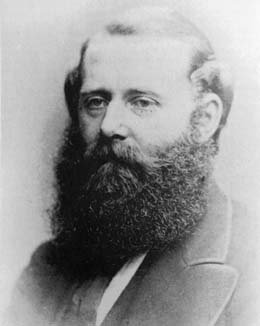
Olaus Magnus Friedrich Erdmann Henrici
 المؤلف:
A R Hall
المؤلف:
A R Hall
 المصدر:
Science for industry : a short history of the Imperial College of Science and Technology and its antecedents
المصدر:
Science for industry : a short history of the Imperial College of Science and Technology and its antecedents
 الجزء والصفحة:
...
الجزء والصفحة:
...
 5-2-2017
5-2-2017
 1309
1309
Born: 9 March 1840 in Meldorf, Holstein (now Germany)
Died: 10 August 1918 in Chandler's Ford, Hampshire, England

Olaus Henrici's father was Theodor Henrici. Olaus entered the gymnasium at Meldorf in 1852 and studied there until 1856. He then worked as an engineering apprentice at Flensburg for three years. While training for this occupation, Henrici's talents were recognised by Clebsch and he entered the Polytechnicum at Karlsruhe in 1859 to study mathematics.
Clebsch persuaded Hesse to take Henrici on as a Ph.D. student at Heidelberg in 1862. Henrici then went to Berlin and studied under Weierstrass and Kronecker. After being appointed a dozent at Kiel University he found it impossible to make sufficient money to live on, so he came to England in 1865 with (perhaps overoptimistic) hope that life would be easier. In England he was barely able to make sufficient money to live on by teaching school level mathematics which at least, he later remarked, greatly helped him in becoming a good teacher. Hesse introduced him to Sylvester who in turn introduced him to Hirst, at that time the professor of mathematics at University College, London. Hirst had been appointed to the post to succeed De Morgan, but was finding the duties very demanding. Employing Henrici as an assistant seemed like a good way of reducing his workload so that is precisely what Hirst did.
In 1869 Henrici was appointed professor of mathematics at Bedford College for Women. Whether the loss of his assistant was a contributory fact to Hirst taking ill around Easter of 1870 is unclear, but being unable to perform his teaching duties he asked Henrici to take over. Wishing more time to undertake research, Hirst decided to take on a less demanding position and resigned his chair at University College around the summer of 1870. Henrici, who at this stage was doing the teaching anyway, was appointed professor of mathematics at University College. He married Helen Stodart Kennedy, the daughter of a Congregational minister, on 15 August 1877. Their son, Ernst Olaf Henrici, became a major in the Royal Engineers but was a fine mathematician who collaborated with his father on a paper in 1912.
In 1879 Clifford, who had been professor of applied mathematics and mechanics at University College, died, and Henrici was asked to take over his teaching duties. Clearly the duties of the two chairs were too much for one person so in 1880 Henrici was formally installed as professor of applied mathematics and mechanics and resigned his chair of mathematics. In 1884 he moved from University College to take up the chair of mechanics and mathematics at the new Central Technical College. This College joined with the Royal College of Science and the Royal School of Mines to become Imperial College of Science and Technology in 1907 and then, in the following year, became part of the University of London.
Henrici made many innovations as a teacher, for example he [1]:-
... introduced projective geometry, vector analysis, and graphical statics into the University College mathematics syllabus - a radical departure from the analytically biased Cambridge-style course previously taught.
He also introduced graphical statics into the Bedford College syllabus and at the Central Technical College he set up a mechanics laboratory. He was interested in mathematical instruments and constructed a harmonic analyser along the lines suggested by William Thomson (Lord Kelvin). This mathematical instrument could compute Fourier coefficients. Henrici wrote some excellent little books to introduce undergraduates to mathematical ideas such as projective geometry in Congruent Figures (1878), and vector methods in Vectors and Rotors (1903). This latter work he intended as the introduction to a much large treatise which he never completed. He was also a major contributor to the eleventh edition of Encyclopaedia Britannica (published in 1910 and 1911) contributing articles on 'calculating machines', 'Euclidean geometry', 'projective geometry', 'projection', 'descriptive geometry', and 'perspective'.
Henrici was elected a fellow of the Royal Society in 1874 and was a member of its Council during 1882-83. In 1882, in addition to serving on the Council of the Royal Society, he was elected President of the London Mathematical Society, holding this position from 1882 to 1884. He was awarded an honorary degree by the University of St Andrews in 1884. He retired from his chair at Imperial College in 1911 and moved to Hampshire.
- Biography by Adrian Rice, in Dictionary of National Biography (Oxford, 2004).
Books:
- A R Hall, Science for industry : a short history of the Imperial College of Science and Technology and its antecedents (1982).
Articles:
- M J M Hill, Professor Olaus Henrici, Proc. London Math. Soc. 17 (1918), xlii-xlix.
 الاكثر قراءة في 1840to1849
الاكثر قراءة في 1840to1849
 اخر الاخبار
اخر الاخبار
اخبار العتبة العباسية المقدسة


